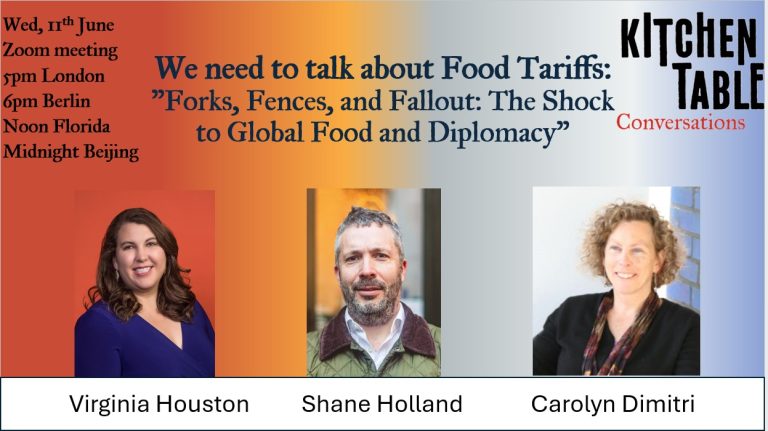
Highlights from the Kitchen Table Conversation- Tariffs, Trade, and the Future of Food
On the eve of the strawberry full moon in June, a diverse panel of food policy experts, economists, and advocates gathered for a Kitchen Table Conversation to unpack the complex intersections of global trade, agriculture, and food systems. Hosted by Scott Alves Barton, the conversation was rich, urgent, and deeply human.
Setting the Table
Scott opened with a personal reflection on his global diet—East African coffee, Swiss muesli, Italian pasta, and more—highlighting how intimately our daily meals are tied to international trade. But with rising tariffs, political instability, and climate change, the future of that interconnected food system is uncertain.
“I feel like I’m ready to bring back the caceroladas demonstrations from Latin America… I’m bereft at how we begin.” — Scott Alves Barton
Tariffs and Uncertainty: A Global Disruption
Dr. Carolyn Dimitri (NYU)
An applied economist, Carolyn emphasized how tariffs inject uncertainty into markets—something farmers and food systems can’t afford.
“Markets don’t like uncertainty. Farmers can’t wait. Harvest doesn’t wait. And wasting food while people go hungry is more than an economic issue—it’s a moral one.”
She also reminded us that tariffs raise consumer prices and can distort food choices, undermining both economic and ethical goals.
Shane Holland (Slow Food in the UK and International)
Shane brought a UK and European perspective, noting that while some tariffs are being reduced post-Brexit, others—like levies and non-tariff barriers—are quietly reshaping food access and production.
“We’re seeing crops not even being planted. That’s a real issue. It’s not just about harvest—it’s about the decision to plant in the first place.”
He also warned of the hidden costs of non-food tariffs, like those on steel and concrete, which affect farm infrastructure and long-term viability.
Virginia Houston (U.S. Soybean Association)
Virginia offered a sobering view from the U.S. heartland, where soybean farmers face retaliatory tariffs from China and the EU.
“We lost the Chinese market overnight in 2018. That took 40 years to build. And we’re on the verge of losing it again.”
She explained how farmers are planting without knowing if they’ll have a market come harvest, and how rising input costs are squeezing already thin margins.
Climate, Conservation, and Fragility
All three panelists agreed: while tariffs are disruptive, climate change is the deeper, more existential threat.
“Climate is the biggest problem. Tariffs are just the icing on the cake.” — Carolyn Dimitri
Shane noted that droughts in the UK and Europe are already affecting crops, and Carolyn pointed to the dismantling of U.S. conservation programs that help farmers build resilience.
Consumer Anxiety and Supply Chains
The panel also explored how just-in-time inventory systems and reduced backstock in stores are increasing fragility.
“Stores no longer have back rooms. Every time we add fragility, we only need one more shock—tariff, war, climate—and the whole thing tips over.” — Shane Holland
Carolyn observed that local and organic producers often weather these shocks better, offering more price stability and community resilience.
Global South and Equity
David Matchett, a participant, raised a critical point: much of the conversation centered on the U.S. and UK, while the Global South—often the most vulnerable—was underrepresented.
“This is sounding like first-world problems. What about the ecological and economic impacts on the Global South?”
Shane responded by highlighting China’s strategic investments in Africa and Latin America, which are reshaping global food flows and sovereignty.
Rebuilding Trust and Looking Ahead
The session closed with a powerful question: how do we restore trust in global food systems?
“We need to treat people, communities, and the planet with respect. Trade should be multidirectional. The planet doesn’t have borders.” — Shane Holland
Carolyn added a hopeful note:
“Maybe this is a moment where things are in such a state of shambles that people will feel more committed to making better choices.”
Final Thoughts
This Kitchen Table was more than a policy discussion—it was a call to consciousness. As Virginia put it:
“Our farmers want to feed the world. That’s not a cliché—it’s a mission.”
And as Scott reminded us, food is political, personal, and planetary. The choices we make—from what we plant to what we buy—shape the world we live in.
David Matchett
